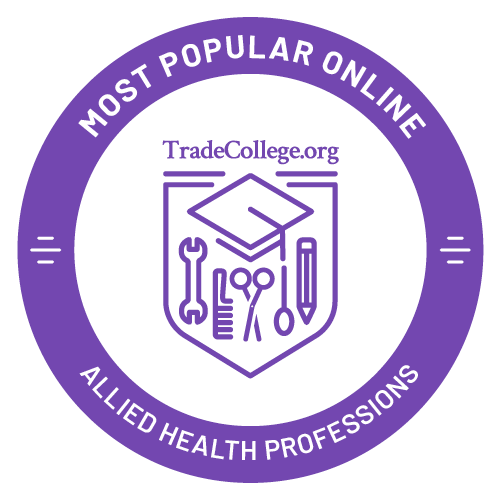Find Trade Colleges
2023 Most Popular Online Allied Health Professions Bachelor's Degree Trade Schools in Missouri
Finding the Most Popular Online Allied Health Professions Bachelor's Degree School for You
In 2021-2022, allied health professions students earned 988 degrees and certificates from a Missouri school, making the subject the 3rd in the state.
When it comes to higher education, there are a lot of options for trade school students. Along with traditional schools that require in-person attendence, you can attend one of many reputable online schools. Some programs even offer a hybrid experience.
To help you arm yourself with the information you need to make your decision, Trade College Search has developed this Most Popular Online Allied Health Professions Bachelor's Degree Trade Schools in Missouri ranking. Our analysis looked at 2 schools in Missouri to see which online bachelor's degree programs were the most popular for trade school students. To create this ranking we looked at how many students graduated from schools with online programs.
Featured schools near , edit
2023 Most Popular Online Allied Health Professions Bachelor’s Degree Schools in Missouri
Check out the online allied health bachelor's degree programs at these schools if you want to attend one of the most popular in Missouri.
Most Popular Online Missouri Trade Schools for a Bachelor's in Allied Health Professions
Our analysis found University of Missouri - Columbia to be the most popular school for allied health professions students who want to pursue an online bachelor’s degree in Missouri. Located in the city of Columbia, Mizzou is a public college with a very large student population.
About 77% of the students majoring in allied health at the school are women while 23% are male.
While working on their Bachelor's Degree, allied health majors at Mizzou accumulate an average of around $21,338 in student debt. This translates to an average monthly loan payment of $342, based on a 10-year repayment plan.
A rank of #2 on this year’s list means Cox College is a great place for allied health professions students working on their online bachelor’s degree. Located in the midsize city of Springfield, Cox College is a private not-for-profit school with a fairly small student population.
Of the 13 students majoring in allied health at Cox College, 15% are male and 85% are female.
After completing their Bachelor's Degree, allied health graduates from Cox College carry an average student debtload of $18,345.
Best Allied Health Professions Colleges in the Plains States Region
Explore all the Most Popular Allied Health Professions Colleges in the Plains States Area or other specific states within that region.
| State | Degrees Awarded |
|---|---|
| Kansas | 851 |
| Minnesota | 719 |
| South Dakota | 217 |
| Iowa | 840 |
| North Dakota | 142 |
| Nebraska | 498 |
Allied Health Professions Related Majors
One of 11 majors within the trade school area of study, allied health professions has other similar majors worth exploring.
Allied Health Focus Areas
Most Popular Related Majors
| Related Major | Annual Graduates |
|---|---|
| Health & Medical Administrative Services | 88,600 |
| Practical Nursing & Nursing Assistants | 85,339 |
| Allied Health & Medical Assisting Services | 83,587 |
| Health Sciences & Services | 36,762 |
| Mental & Social Health Services | 30,331 |
Notes and References
*These averages are for the top 2 schools only.
- The Integrated Postsecondary Education Data System (IPEDS) from the National Center for Education Statistics (NCES), a branch of the U.S. Department of Education (DOE) serves as the core of the rest of our data about colleges.
- Some other college data, including much of the graduate earnings data, comes from the U.S. Department of Education’s (College Scorecard).
More about our data sources and methodologies.



